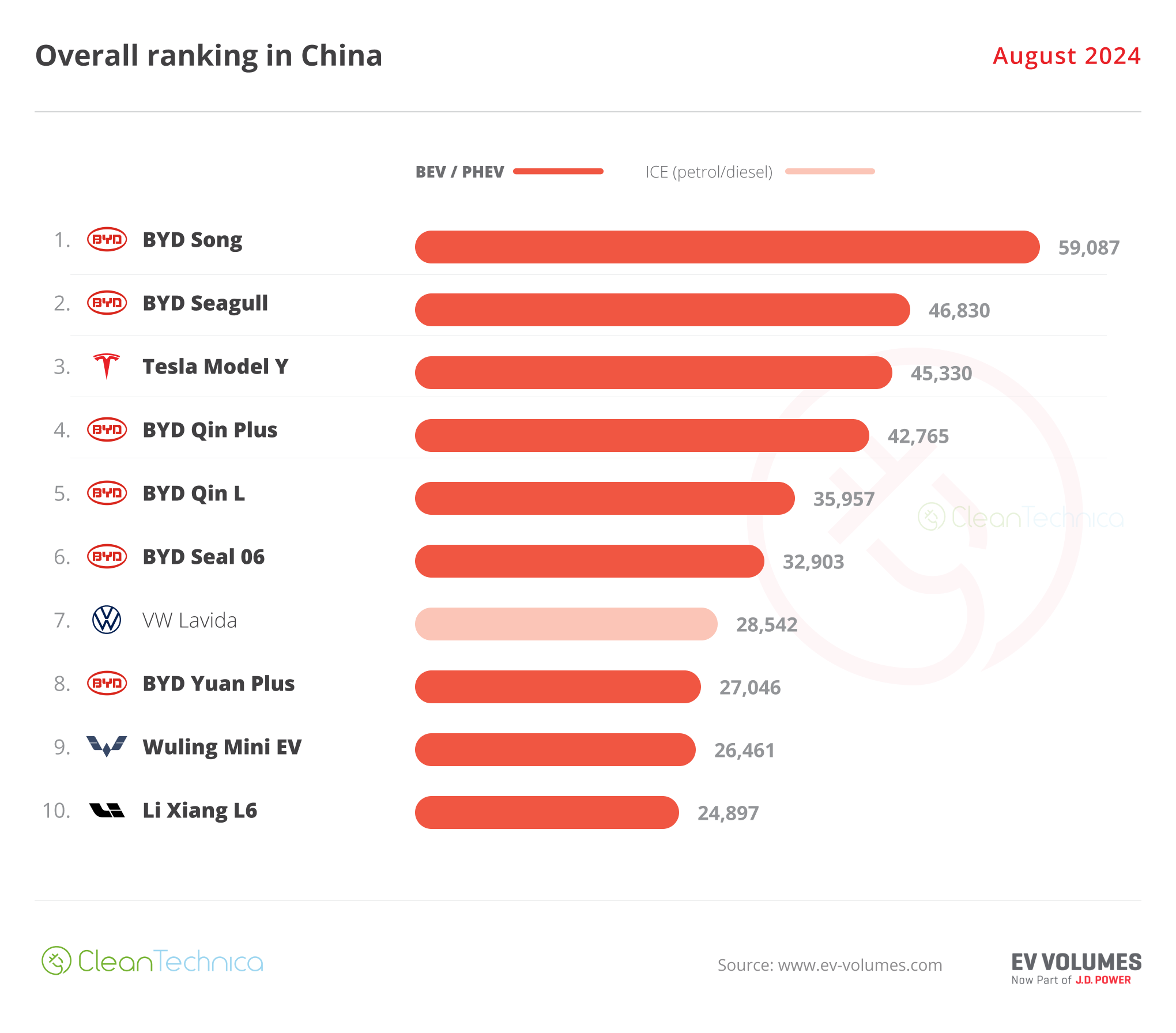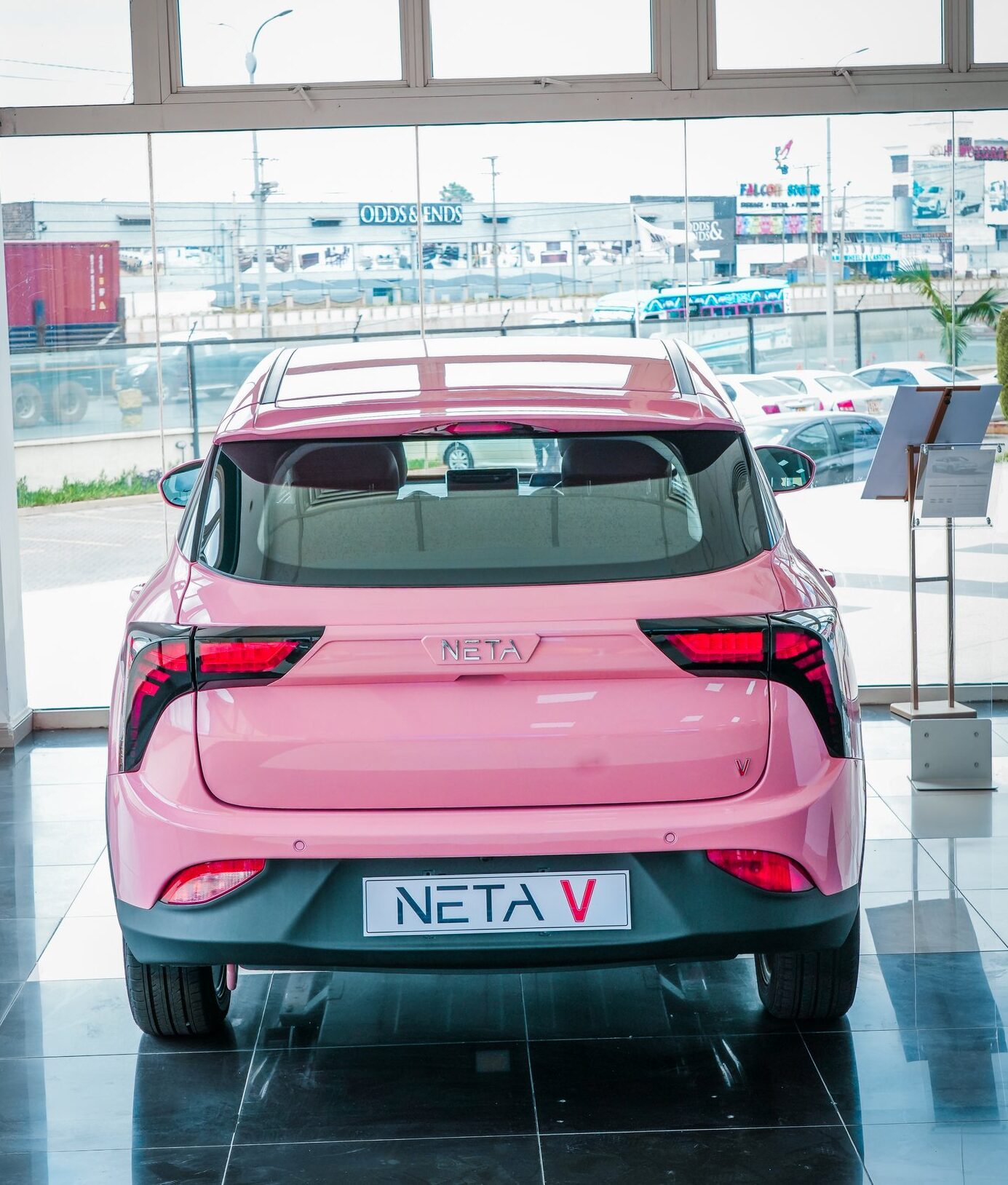
July saw plugin EVs at 28.6% share in Germany, up from 19.1% share year-on-year. BEV volume increased by 58% YoY, while PHEVs grew 84%. Overall auto volume was 264,802 units, up some 11% YoY. July’s best-selling BEV was the Volkswagen ID.3.

July’s auto sales saw combined EVs at 28.6% share in Germany, with full electrics (BEVs) at 18.4% share, and plugin hybrids (PHEVs) at 10.3%. These compare with YoY figures of 19.1% combined, 12.9% BEV, and 6.2% PHEV.
The YoY baseline (July 2024) was weak, with the EV market then still reeling from the late December 2023 surprise cancellation of BEV incentives. Thus the YoY growth figures may appear particularly impressive. Stepping back, Germany is now slightly ahead of France on EV market share (mostly due to stronger PHEV share), and somewhat behind the UK market. This is nevertheless a welcome return to a growth trajectory from last year’s back-sliding.
The year-to-date cumulative combined EV share is now 27.8% with 17.8% BEV, and 10.0% PHEV. The equivalent figures from 2023 YTD were 22.1% combined, with 16.4% BEV, and 5.7% PHEV.
We can see that PHEVs have grown share strongly, which is understandable given that the newest generation typically have over 80km of all-electric range, and can cover most of their annual driving on electricity. At this stage of the transition in Germany, PHEVs still have a role to play, even though they are now passé in a more advanced market like Norway, and are becoming so in China also (not counting EREVs, which are closer to BEVs than to hybrids).
Combined EVs are ahead of petrol-only sales again, and have been for 5 of the 7 months so far in 2025. They will likely stay ahead in the future.
If we combine petrol-only and diesel-only, these ICEs are still ahead of combined EVs, with 42.6% share in July, though that is a big fall from the 52.1% of July 2024. Expect these ICE-only sales to fall below 40% by Q4 this year, and likely stay under 40% next year.

Best-Selling BEV Models
The Volkswagen ID.3 again took the top spot in July, with 2,907 units, maintaining its lead from June. In second place was the ID.7, with 2,765 units, just ahead of another Volkswagen model, the ID.4/ID.5 in third, with 2,682 units. This is a satisfying top 3 result for the Volkswagen brand in its home market.

Further back, movements were fairly minor, with the BMW iX1 climbing 2 spots to 4th, and the Skoda Elroq dropping 3 spots to 5th. Just outside the top five, the Mini Cooper improved a few spots to 7th, and the Audi Q4 e-tron improved several spots to 13th. Back in 17th spot, the Kia EV3 saw its biggest ever volume, with 939 units, though note that it does tend to arrive in irregular batches from Korea.
The highest climber of any new model launched this year was the Ford Puma, far back in 44th place (243 units), followed by the Renault 4 in 47th place (226 units).
The MG S5, which debuted in June with 78 units, held its ground in July, with 71 units. The other significant June debutant, the Hyundai Ioniq 9, increased from 6 to 39 units.
The small-and-affordable models were led by the Hyundai Inster with a strong 1,171 units (ranking 9th). Not too far behind was the Renault 5, with 916 units (ranked 18th).
The Citroen e-C3 was some way back with a personal best of 547 units, only just ahead of the Dacia Spring with 518 units, both far outside the top 20. The Leapmotor T03 also saw a personal best of 438 units. The BYD Dolphin Surf had a big month in June (817 units), but was on a logistics ebb in July with just 36 units.
Let’s now turn to the trailing 3-month results:

Volkswagen Group models remain very strong, and took the top 5 spots in the July table (and 2 further spots in the top 10). The new Skoda Elroq has now consolidated its position in Germany, with its second consecutive month in the top three spots.
The most significant mover was the Hyundai Inster, up 9 places from the prior period, to 10th spot. This is a great result, and the Inster is now HMG’s best selling BEV in Germany by a decent margin (the EV3 is in 19th spot).
In terms of the upward progress of other new models, the BYD Dolphin Surf is now in 41st spot, after just one volume month (June). The Ford Puma is in 43rd after four steady but flat months of volume, and may have found its comfort zone (until Ford needs to meet tighter emissions rules, and sell more). After just two growing months, the new Renault 4 is in 53rd spot and is set to keep climbing. Let’s keep an eye on the Surf and the 4 in the coming few months as they climb higher.
Manufacturing Group Rankings
As Germany is Europe’s largest single auto market, and one for which fairly complete market data is promptly available, it’s worth doing a manufacturing group round up, with the caveat that other large European markets have a very different balance of brands and groups (e.g. France).

Over the latest three months, the top 10 ranks have barely changed since the prior period (February to April). Far ahead in top spot, Volkswagen Group grew its sales 4% over the prior three months, to over 60,000 units, and took 43.9% of the German BEV market. This was a slight dip from 47.4% over the prior period, likely because the Group has also pushed volume into other countries around Europe.
BMW Group remains in second place, having grown sales by 24%, and gained an additional 1.2% slice of the market, now at 12.8%. Stellantis has now advanced to third, grew 26% sales volume and grabbed an additional 0.9% share to claim 8.6%. It swapped places with HMG, which grew volume by a smaller 17% and gained 0.3% (to occupy 8.4%).
In fifth and sixth spots Mercedes Group, and Renault-Nissan, are fairly static, with little change over the prior period.
Ford grew its sales by 42% over the prior period and gained an additional 0.7% market share to occupy 3.4% share. This growth in share advanced Ford by two ranks to 7th spot, displacing Tesla down a spot, and pushing Geely just outside the top 8.
Tesla was the only one of the top 10 groups to lose volume (by 8%) over the prior period, and lost 0.7% market share, now down to 3.0% share.
With Geely (3.0%) in 9th, BYD is now in 10th spot (with 2.3% share). Note that BYD – with its wide array of models, including affordable models – has already overtaken Tesla to become the best-selling BEV brand in both Spain and Italy in H1 2025. It’s easy to envisage BYD potentially overtaking Tesla in Germany in the coming 6 months or so.
Outlook
Germany’s EV transition is now on a welcome recovery track since its disastrous 2024. PHEVs are doing some heavy lifting, but that’s okay at Germany’s stage of the transition, and BEVs are still growing at a healthy clip, up in volume by 38.4% year-to-date. This is despite the overall market being down YTD by around 1%.
The German economy is still very weak, but the latest “revisions” by the federal statistics office have turned Q1’s 0% YoY GDP growth to +0.3%, the first positive economic news in over two years. Q2 looks to have continued the trend to 0.4% YoY GDP growth.
Headline inflation remains at 2%, ECB interest rates remain at 2.15%, and manufacturing PMI was almost flat at 49.1 points in July, from 49.0 in June. Both consumer confidence and business confidence remain weak, however.
Will Germany remain on an EV growth trajectory for the rest of the year? Which models will continue to climb in the months ahead, and what new models will have a significant early impact? What further segments and price points are now most needed to accelerate the transition? Please share your thoughts and perspectives in the comments section.
Sign up for CleanTechnica’s Weekly Substack for Zach and Scott’s in-depth analyses and high level summaries, sign up for our daily newsletter, and follow us on Google News!
Have a tip for CleanTechnica? Want to advertise? Want to suggest a guest for our CleanTech Talk podcast? Contact us here.
Sign up for our daily newsletter for 15 new cleantech stories a day. Or sign up for our weekly one on top stories of the week if daily is too frequent.
CleanTechnica uses affiliate links. See our policy here.
CleanTechnica’s Comment Policy




